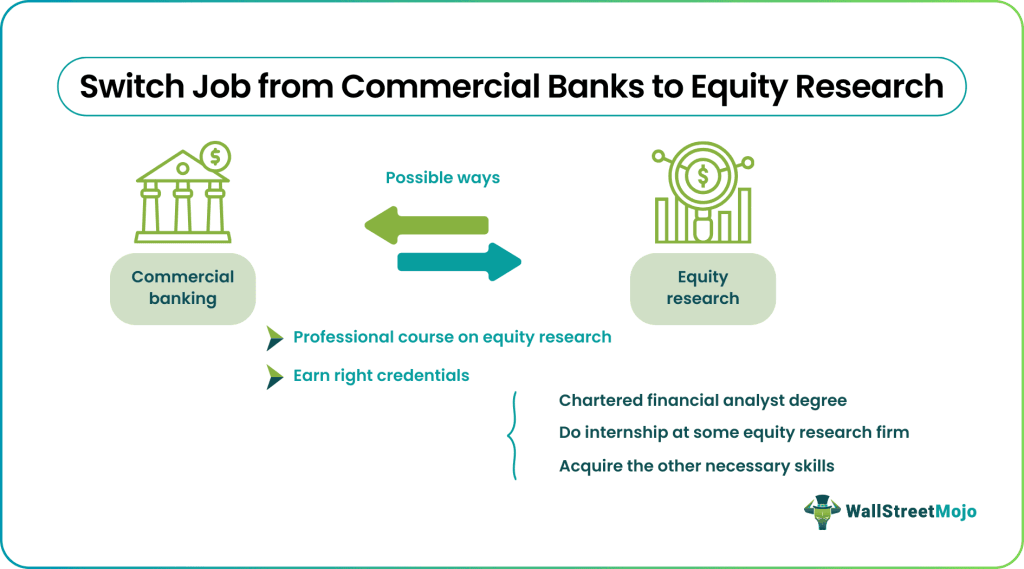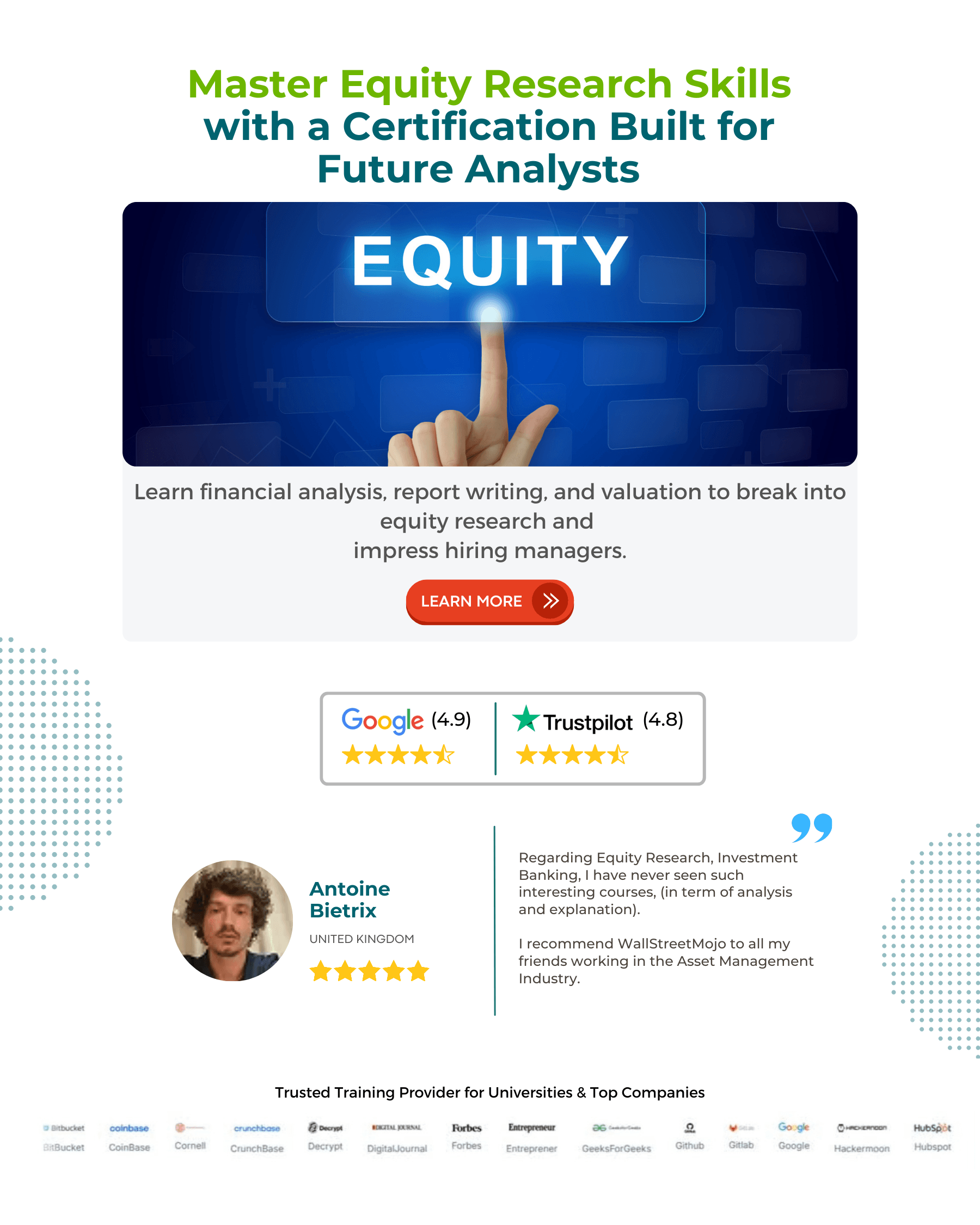Table Of Contents
How To Switch Job From Commercial Banks to Equity Research?
To switch the job from commercial banks to equity research, one should take the help of its professional network having experience of the same, earn the right credentials such as getting the Chartered Financial Analyst degree, do an internship at some equity research firm to gain experience, and acquire other necessary skills using the different programs on the equity research.

Commercial Banking
Commercial banks provide an entire range of retail banking services to individuals and businesses, including checking and savings accounts, fixed deposits, and other products, along with offering a line of credit to their customers. Most commercial banking roles require good communication skills; knowledge of finance and technical expertise would be an added advantage. However, the exact nature of prerequisites depends on the part taken up.
Some of the most common positions in commercial banking include among others:
Trust officer
Loan officer
Bank teller
Branch manager
Equity Research
Equity research essentially involves in-depth stock analysis employing several useful tools and preparing detailed reports on the worth of a specific investment. Equity research analysts need to have an expert knowledge of financial modeling and valuation principles on which a significant proportion of their work is based. Equity research holds great value for the industry as some of the critical investment decisions by individual and institutional investors are based on the work of these analysts.
Requirements:
To be successful at it, one should have incisive analytical abilities.
Expert knowledge of financial concepts
A great deal of clarity in complex concepts related to valuation and other areas to make an objective assessment of investments based on relevant factors.
Their responsibilities include:
Writing research reports
Building financial models
Financial analysis of cash flows, earnings of the company and balance sheets.
Those planning to shift from commercial banking to equity research might already have a good idea about both areas. Still, we have attempted to broadly define the professional roles for a reason, to enable one to see the difference between these two.
Commercial Banking vs. Equity Research
As we can see clearly, these are two completely different areas of finance, with little direct correlation, one of them exclusively dealing with the provision of banking services to clients and the other dealing with a comprehensive analysis of certain stocks, including their valuation, which is not an easy task by any means.
Let us chalk out a few significant differences between commercial banking and equity research here:
Commercial banking involves dealing with clients regularly, whereas equity research has little in terms of regular public engagement. One needs to be able to work independently in equity research.
While commercial banking does require a good knowledge of finance and banking practices, equity research requires a whole different level of acquaintance with financial principles for stock analysis, financial modeling, and valuation.
Equity research also requires detailed knowledge of economic factors influencing the stock movements, and most of the knowledge acquired as a commercial banker may not be of much use.
Equity research requires a higher level of patience, self-discipline, and the ability to assimilate a complex set of factors into a coherent whole to prepare a study that can be of great utility to investors. One should also excel at writing and be able to prepare detailed reports based on the research work undertaken.
Equity research also requires a higher level of work ethics as analysts are routinely required to interact with the top management of the firms whose valuation they are working on. It involves a tightrope walk not to alienate the management while maintaining complete neutrality in stock valuation. There are few such comparisons in a commercial banking role.
In commercial banking, a risk-reward component is rather low as most decision-making is by consensus with other team members or those in higher positions. On the contrary, there is a much higher risk-reward component in equity research, and independent decision-making and problem-solving skills play a crucial role.
Now let us get to the part where we discuss possible ways to make a successful switch from commercial banking to equity research.
Connect with Professionals:
To begin, it will be critical to find some useful, practical advice and assistance, which most likely can come from professionals who have already switched from commercial banking to equity research. Understandably, it may not be the easiest of things to zero in on the right individuals, as few leap this kind in terms of career roles. However, with the right kind of networking, it may not be that much difficult to locate someone who has made a switch and successfully so.
Apart from your professional network, it could be beneficial to scour through professional networking sites, including LinkedIn, which could be of great utility in this respect. These individuals could help you immensely with this professional transition, and you could benefit in these ways.
Learn from their experience of transition
Receive useful guidance
Prepare for obstacles you might encounter along the way
Most importantly, they can better appreciate your point of view and might be able to help with recruitment as well.
Alternatively, you could benefit from their recommendation for an equity analyst role in a good organization.
One of the primary reasons behind the significance of such a find is that the conventional hiring process is unlikely to work in your favor most of the time. Here, networking could help you out more than anything else.
Earn the Right Credentials
It could be one of the essential steps in making this switch, as you may not be able to make real progress in the desired direction without possessing suitable credentials. Some of the relevant choices include:
CFA (Chartered Financial Analyst) could perhaps be the single most significant certification which can help validate your skills in equity analysis, financial modeling, and valuation techniques. Completing the CFA program is not going to be an easy task, but you can plan and focus on clearing individual CFA levels, and by the time you complete the certification program, you could well be in for the long ride. It would surely help open up several opportunities in equity analysis.
You can check out the Complete CFA Exam Guide here.
Alternatively, getting an internship in equity research could also help prove to be an even better option than pursuing a certification program. It brings along the added benefit of practical exposure to the field. It might be considered a somewhat risky move, especially if you are already a middle-level professional, but it could be worth it.
Also, you can enroll for professional courses on Equity Research that will help jump start on equity research skills.
Acquire Necessary Skills
It could be the most challenging part of the deal since you must already possess the basic skills required and can only work on refining them to your advantage.
Some of the critical skills needed for an equity research analyst include making independent decisions and complex problem solving, among other things.
An equity researcher would be required to think critically to paint a clear picture of the prospects of a specific investment through fairly detailed equity research reports.
It brings us to equity research report writing, another vital skill for the job. One might have to prepare several documents, including well-researched reports focusing on a specific investment.
Financial modeling holds the key to the successful application of the principles of equity research, and if you can be good at it, it will add to your chances of success.
You must have expert knowledge of Excel as an indispensable tool for performing many operations.
You have to be good at preparing and analyzing financial statements and performing ratio analysis along with other tasks of mathematical nature.
Also, you should master valuation skills, especially the DCF Analysis, FCFF, Comparable Comps, Relative Valuations, etc.
They should have the ability to express rather complex ideas in a simplified manner and should possess excellent interpersonal skills to communicate effectively across levels.
Should be aware of industry-relevant tools and trends and be able to assess how industry-level changes influence a certain business.
You can look at these Top 5 Equity Research Skills.
Cracking the Interview
If you do manage to have an interview scheduled, it is imperative to be able to strategize and develop an effective approach to handle more complex queries with success.
We might look at what you have in your arsenal to counter these queries and whether it would work.
Query:
One of the possible queries related to commercial banking is your first career choice instead of equity research, and why do you want to make a switch now. These questions might sound simple enough, but tackling them the right way could hold the key to making any real headway.
Response: To tackle the most crucial query about equity research not being your initial choice, you need to work on an original response based on your feelings. Interviewers usually have enough experience and industry awareness at their command to see through any superficial responses, which may not be helpful for you. You should admit that you were not aware of equity research as a specialized field or somehow could not make an entry due to a lack of necessary credentials or other reasons. It is here that one could learn and truly benefit from the experience of former commercial bankers who have gone ahead to adopt a career in equity research.
Why you wish to enter equity research now is a separate question from the first one, although closely related. So be prepared with a response you believe in because if you do not have enough confidence in what you say, another person might scarcely believe you.
Query:
Next comes the question of critical skills for the job. Most likely, the interviewer would put your abilities in equity analysis and knowledge of financial modeling to test before moving ahead.
Response: As far as critical skills are concerned, you may need to showcase your financial modeling and analysis knowledge by fielding a few tough questions. Expect the unexpected and be prepared for anything. You should generally say farewell if you are comfortable with the concepts and know-how to apply them.
Query:
Credentials are a must to make an impression on your interviewer. You must possess relevant certifications as well, which would help create greater trust in the eyes of prospective employers.
Response: You should have completed CFA or other relevant certifications we have discussed earlier. It would also be highly useful if you took an equity research internship with a good firm. It could afford an invaluable advantage in helping you acquire practical skills and theory.
Query:
Last but not least, the interviewer could question whether you have the ideal outlook to be successful at equity research.
Response: To handle queries of this nature, you should be able to display a real interest in exploring equity research and be comfortable with it. You can also talk about some of the transferable skills from commercial banking which work for you in equity research. Still, you have to keep in mind that most of the time, equity research requires a higher level of self-discipline, dedication, and self-motivation to succeed. You would need to draw on your knowledge and whatever little experience you might have in the field, maybe in an internship or an entry-level job, which would come in handy.
Conclusion
The decision to switch your career to a more competitive area, from commercial banking to equity research, would invariably be a challenging task. However, with the right kind of preparation for acquiring the necessary knowledge, skills, and credentials, you can make a concerted effort in the direction that might well pay off. Of course, the single most important thing is to have confidence in your abilities to see through this career transition successfully.

